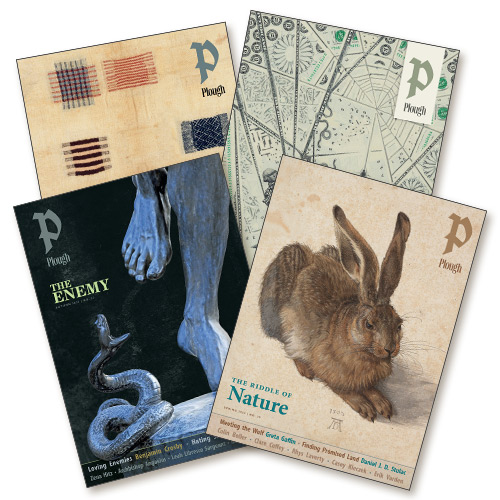Subtotal: $
CheckoutAbout This Issue
Dear Reader,
“Thy kingdom come…on earth as in heaven.” The earth is our origin and also our final destination – it’s the place where the kingdom of God will one day be a reality. After all, the Bible opens with God establishing earth as his garden and closes with him reclaiming it as his home. The resurrection of Jesus’ flesh-and-blood body at Easter leaves no doubt that God truly does love his creation, including the earth and all the life it sustains.
Today, for the first time in history, it is possible for millions of people to go through life for long stretches acting as if nature did not exist. Technology allows us to immerse ourselves in an artificial cocoon, detaching ourselves not only from the natural world but also from our fellow human beings, who remain stubbornly non-virtual. And technology cannot bear all the blame. For millions in the cities, nature has become like grass-fed organic beef: a luxury reserved for those who can afford to develop a taste for it.
But the earth is not just ours to enjoy or ignore as we choose. As the contributors to this issue bring home to us, it is God’s earth. This doesn’t mean we should simplistically equate the gospel with ecological activism, as N. T. Wright makes clear. But it does mean working toward the day when “creation itself will be set free from its bondage to decay and will obtain the freedom of the glory of the children of God” (Rom. 8:21) – the day when “the earth will be full of the knowledge of the Lord as the waters cover the sea” (Isa. 11:9).
To carry out our task on earth, we need to get dirt on our hands. The following pages feature a variety of people who are doing just that. Claudio Oliver tells how his church in Brazil has become a gardening community. Mary Eubanks recounts her adventures developing drought-resistant varieties of corn for Africa. Bill McKibben calls us to respond to climate change by replacing hyper-individualism with local economies of sharing. Other contributors help us catch glimpses of God’s revelation in nature through bird watching, work on a dairy farm, the legacy of John Muir, and the painter’s vision.
Creation naturally includes humankind, made by God as male and female. Last November, religious leaders of many faiths gathered from around the world at the Vatican to reflect on how to promote this truth; the speakers included several Plough writers.
And as always, we’d love to know what you think. What would you like to see more of? How can we improve? We look forward to hearing your thoughts.
Warm greetings,
Peter Mommsen,
Editor
Front cover photograph: Isabel Merritt















